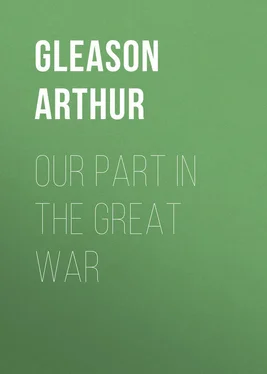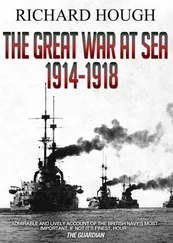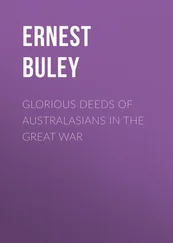Arthur Gleason - Our Part in the Great War
Здесь есть возможность читать онлайн «Arthur Gleason - Our Part in the Great War» — ознакомительный отрывок электронной книги совершенно бесплатно, а после прочтения отрывка купить полную версию. В некоторых случаях можно слушать аудио, скачать через торрент в формате fb2 и присутствует краткое содержание. Жанр: foreign_antique, foreign_prose, на английском языке. Описание произведения, (предисловие) а так же отзывы посетителей доступны на портале библиотеки ЛибКат.
- Название:Our Part in the Great War
- Автор:
- Жанр:
- Год:неизвестен
- ISBN:нет данных
- Рейтинг книги:5 / 5. Голосов: 1
-
Избранное:Добавить в избранное
- Отзывы:
-
Ваша оценка:
- 100
- 1
- 2
- 3
- 4
- 5
Our Part in the Great War: краткое содержание, описание и аннотация
Предлагаем к чтению аннотацию, описание, краткое содержание или предисловие (зависит от того, что написал сам автор книги «Our Part in the Great War»). Если вы не нашли необходимую информацию о книге — напишите в комментариях, мы постараемся отыскать её.
Our Part in the Great War — читать онлайн ознакомительный отрывок
Ниже представлен текст книги, разбитый по страницам. Система сохранения места последней прочитанной страницы, позволяет с удобством читать онлайн бесплатно книгу «Our Part in the Great War», без необходимости каждый раз заново искать на чём Вы остановились. Поставьте закладку, и сможете в любой момент перейти на страницу, на которой закончили чтение.
Интервал:
Закладка:
He stumbled down two steps cut in clay and bent over to enter the earth cave. "I will lead you," he said, taking me by the arm.
"Wait while I close the door," he said; "we must not show any light."
When the cave was securely closed in he flashed a pocket electric. We were in a room scooped out of the earth. The roof was so low that my casque struck it. A cot filled a third of the space. The available standing room was three feet by six feet.
"You will forgive me for asking it," he went on, "but please use your pocket lamp; mine is getting low and I am far away from supplies. We can get nothing up here."
My friend handed over his lamp. The clergyman flashed it on a photograph pinned against a plank of wood.
"My wife," he said; "she is an American girl from Bensonhurst, Long Island. And that is my child."
He turned the light around the room. There were pages of pictures from the London Daily Mail and the New York Tribune . One was a picture of German soldiers in a church, drinking by the altar.
"I call this my New York corner," he explained, "and this is my visiting card." From a pile he lifted a one-page printed notice, which read:
"Declaration Religeuse.
"I, the undersigned, belong to the Protestant religion. In consequence and conforming to the law of 1905, this is my formal wish: In case of sickness or accident, I wish the visit of a Protestant pastor and the succor of his ministry whether I am undergoing treatment at a hospital or elsewhere; in case of death I wish to be buried with the assistance of a Protestant pastor and the rites of that Church."
Space is left for the soldier to sign his name. The little circular is devised by this chaplain, Pastor – , chaplain of the – Division.
At 2 o'clock in the morning we were ordered to load our car with the wounded, one "lying case," three "sitting cases." We discharged them at the hospital, and tumbled into the tent at Ippecourt at 4 o'clock.
V
"FRIENDS OF FRANCE"
American relief work in France has many agencies and activities. I have given illustrations of it, but these are only admirable bits among a host of equals. I have told of the American Field Service. Other sections of young Americans have been at work in the hottest corners of the battle front. The Harjes Formation and the American Volunteer Motor Ambulance Corps, known as the Norton Corps, have made a name for daring and useful work with their one hundred cars on the firing line. What the Field Service has done, they too have done and suffered. It was with a glow of pride that I read the name of my Yale classmate, W. P. Clyde, junior, of the Norton Ambulance, cited in an order of the day, and made the recipient of the French War Cross. The commanding general wrote of him:
"Volunteer for a perilous mission, he acquitted himself with a cool courage under a heavy and continuous fire. He has given, in the course of the campaign, numerous proofs of his indifference to danger and his spirit of self-sacrifice."
I have shown the contribution of scientific skill and mechanical ingenuity which Americans have made in hospital and ambulance work. There remains a work in which our other American characteristic of executive ability is shown. Organization is the merit of the American Relief Clearing House. When the war broke out, American gifts tumbled into Paris, addressed and unaddressed. There was a tangle and muddle of generosity. The American Relief Clearing House was formed to meet this need. It centralizes and controls the receipt of relief from America intended for France and her Allies. It collects fresh accurate information on ravaged districts and suffering people. It prevents waste and overlapping and duplication. It obtains free transportation across the ocean for all gifts, free entry through the French customs, and free transportation on all the French railways. It forwards the gifts to the particular point, when it is specified. It distributes unmarked supplies to places of need. It receives money and purchases supplies. It has 114 persons giving all their time to its work. It has issued 45,000 personally signed letters telling of the work. It employs ten auto trucks in handling goods. It has concentrated time, effort and gifts. It has obtained and spread information of the needs of the Allies. It has been efficient in creating relationship between the donor in America and the recipient in France, and in increasing good will between the nations. I do not write of the Clearing House from the outside, but from a long experience. For many months my wife has given all her time to making known the work of Miss Fyfe who manages the work of relief for civilians, their transportation, and conducts a refugee house, and a Maternity Hospital in the little strip of Belgium which is still unenslaved. Little local committees, such as Miss Rider's in Norwalk, in Cedar Rapids, in Montclair, and in Douglaston, L. I., have been formed, and 36 boxes of material, and over $1,500 in money, have been given. Those supplies the Clearing House has brought from New York to La Panne, Belgium, free of charge, promptly, with no damage and no losses. What the Clearing House has done for this humble effort, it has done for 60,000 other consignments, and for more than a million dollars of money. It has distributed supplies to 2,500 hospitals and 200 relief organizations in France. It has sent goods to Belgium, Salonica, to the sick French prisoners in Switzerland. It dispatched the ship Menhir for the relief of Serbian refugees. It has installed a complete hospital, with 200 beds and a radiograph outfit. The cases which it transports contain gauze, cotton, bandages, hospital clothing, surgical instruments, garments, underwear, boots, socks. The names of the men who have administered this excellent organization in Paris are H. O. Beatty, Charles R. Scott, Randolph Mordecai, James R. Barbour, and Walter Abbott.
After the claims of immediate dramatic suffering, comes the great mute community of the French people, whose life and work have been blighted. And for one section of that community the Association of " Les Amis des Artistes " has been formed. "To preserve French art from the deadly effects of the war, which creates conditions so unfavorable to the production of masterpieces of painting, sculpture, architecture, decorative arts, engraving," is the object of this society. The members see that other forms of activity will swiftly revive after the war. "The invaded districts will be rebuilt, business will flourish. But art will have a hard and prolonged struggle." The society purchases from its funds the works of men of talent whom the war has robbed of means of support. These paintings, statuary, engravings, so acquired, are annually divided among the members. The purchase is made by a committee composed of distinguished artists, critics and connoisseurs, representing the three great French salons and the various art tendencies of the modern movement. The Honorary Committee includes Bakst, Hanotaux, Maeterlinck, Rodin and Raemaekers. Americans who are aiding are Mrs. Mark Baldwin, Mrs. Paul Gans, Walter Gay, Laurence V. Benét, and Percy Peixotto.
The new American fund of the "Guthrie Committee" for the relief of the orphans of war has been recently announced. It is planned to raise many millions of dollars for this object.
Children, artists, invalid soldiers, refugees – there is a various and immense suffering in France at this moment, and no American can afford to be neutral in the presence of that need. The sense of the sharp individual disturbance and of the mass of misery came to me one day when I visited the Maison Blanche. We entered the open air corridor, where a group of thirty men rose to salute our party. My eye picked up a young man, whose face carried an expression of gentleness.
Читать дальшеИнтервал:
Закладка:
Похожие книги на «Our Part in the Great War»
Представляем Вашему вниманию похожие книги на «Our Part in the Great War» списком для выбора. Мы отобрали схожую по названию и смыслу литературу в надежде предоставить читателям больше вариантов отыскать новые, интересные, ещё непрочитанные произведения.
Обсуждение, отзывы о книге «Our Part in the Great War» и просто собственные мнения читателей. Оставьте ваши комментарии, напишите, что Вы думаете о произведении, его смысле или главных героях. Укажите что конкретно понравилось, а что нет, и почему Вы так считаете.












